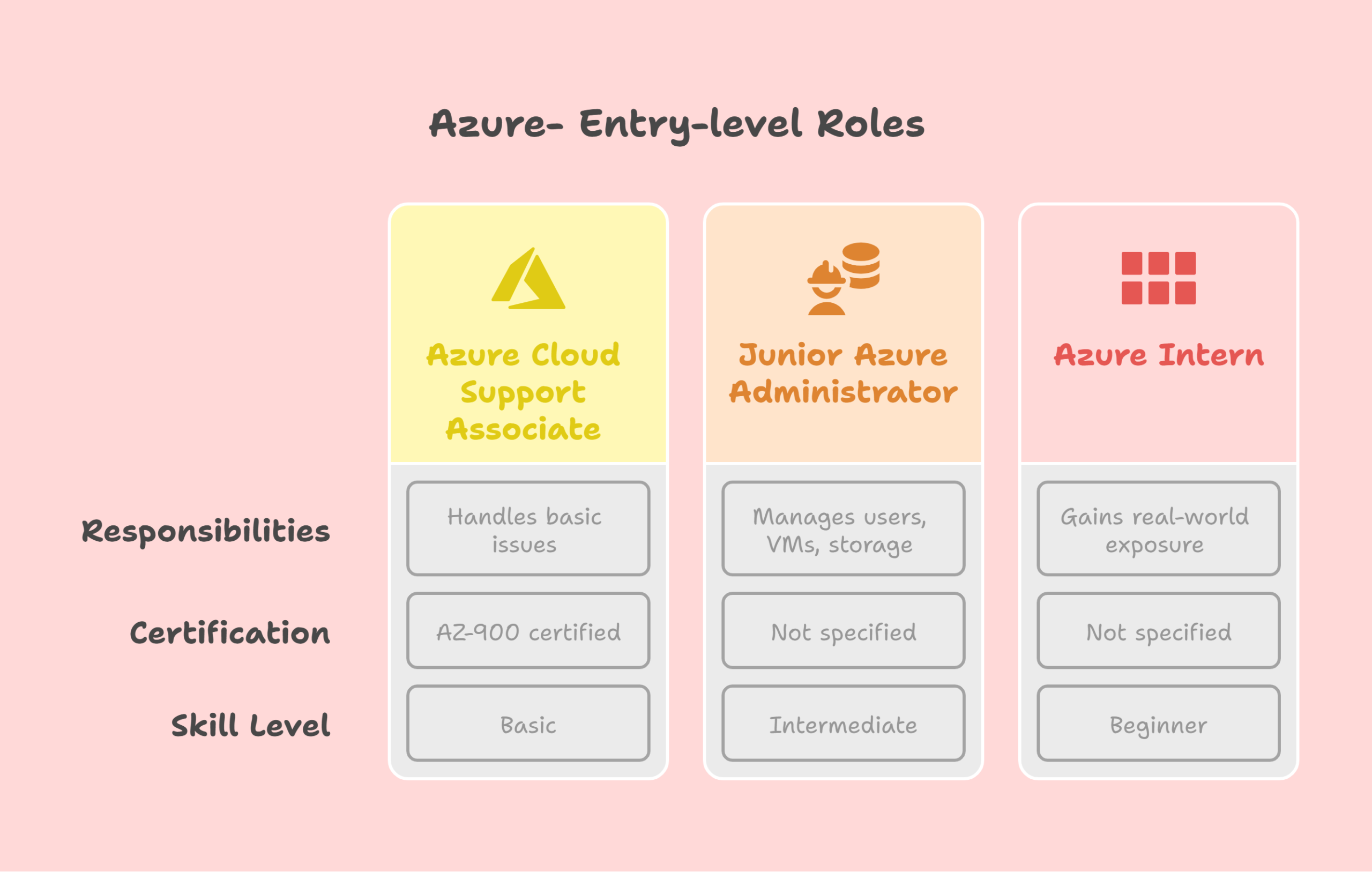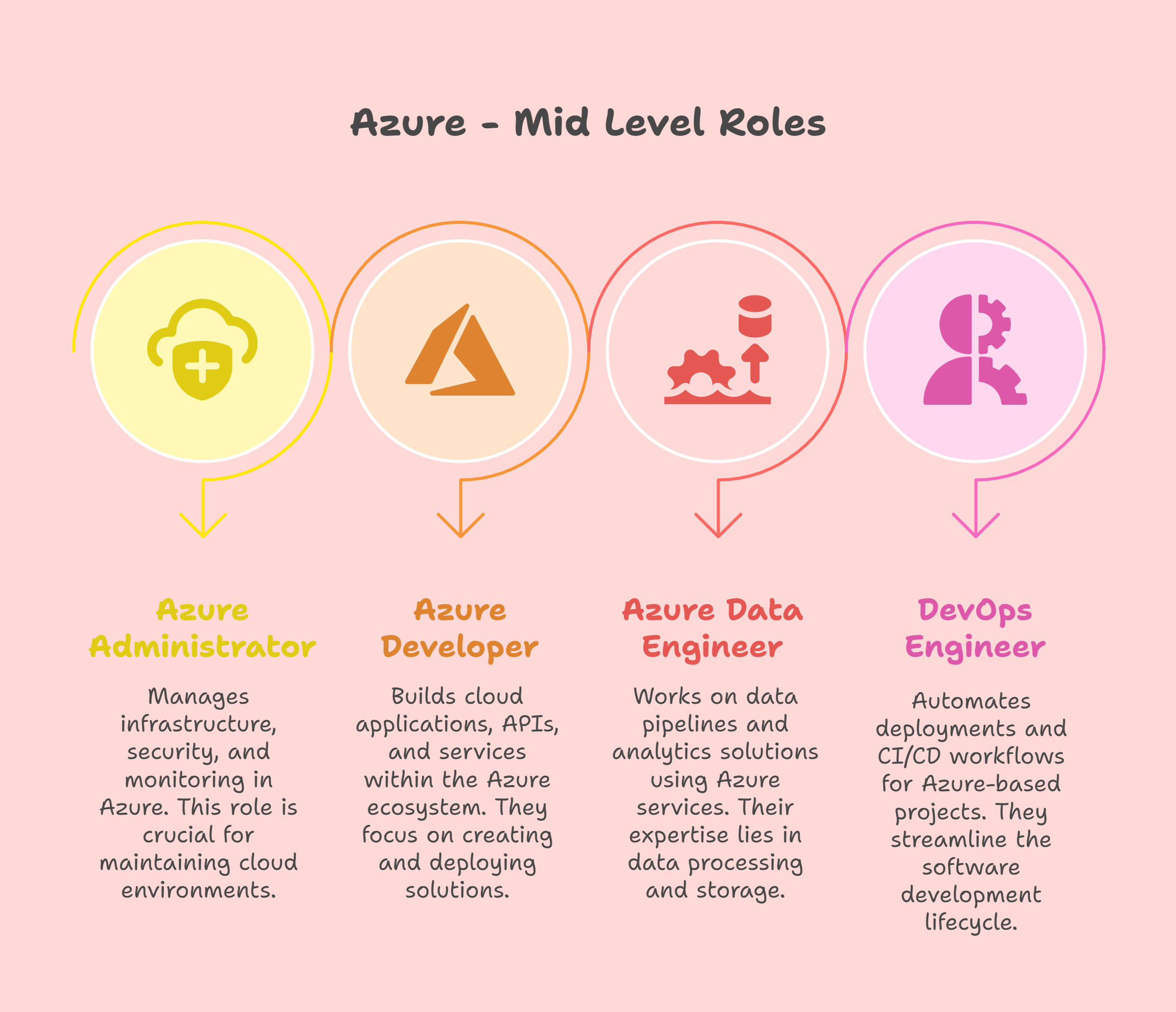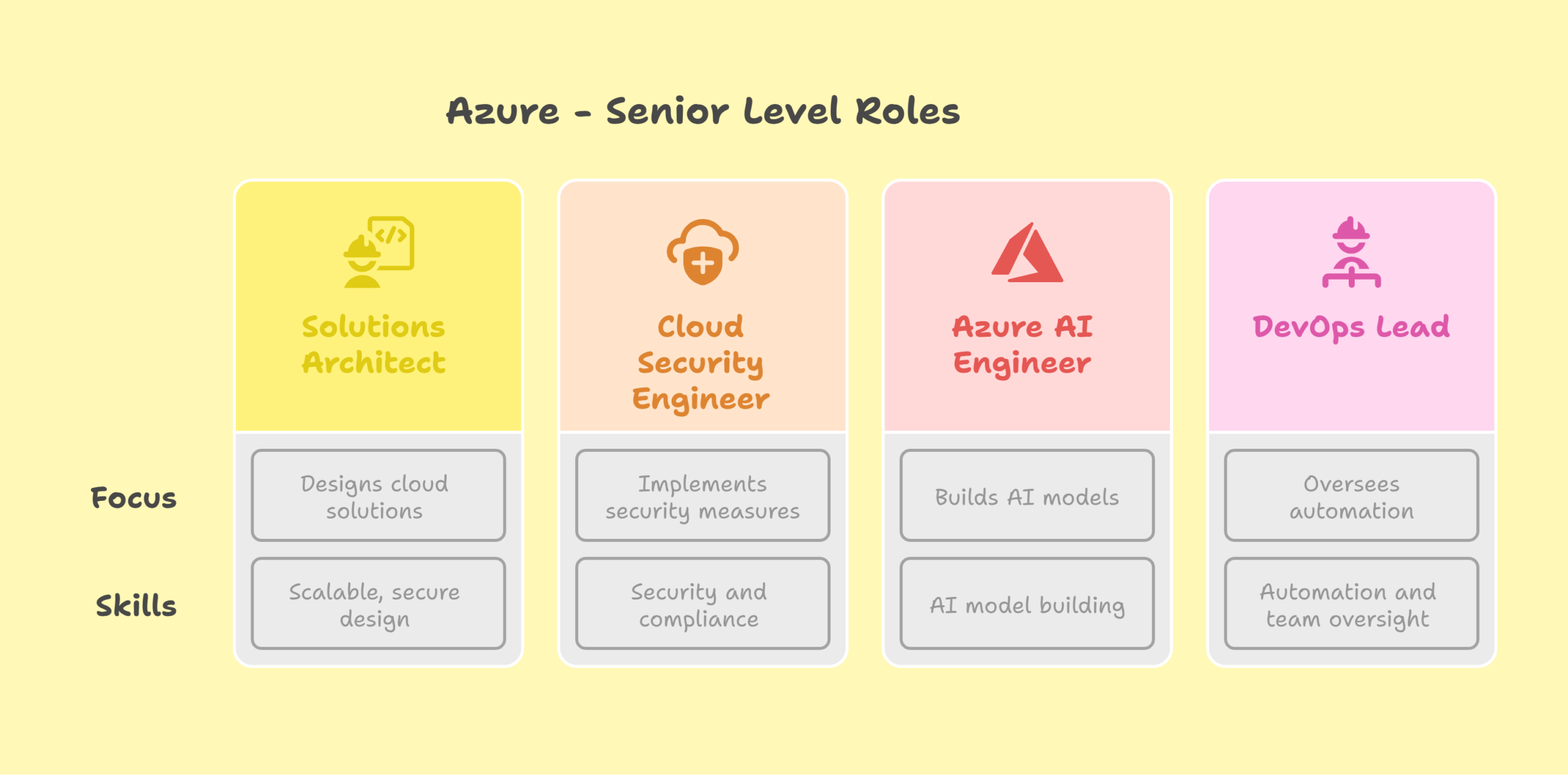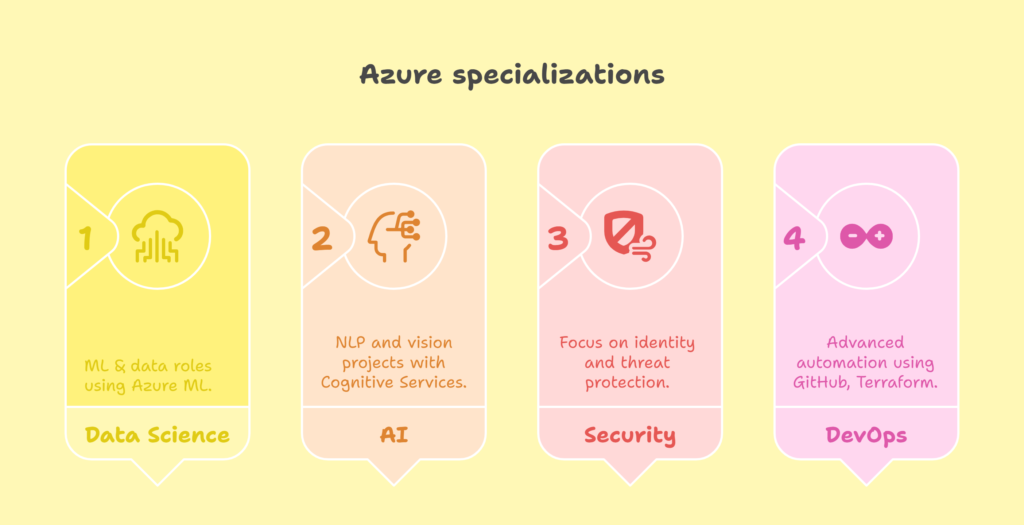Table of Contents
Microsoft Azure career path is gaining huge popularity. More companies are adopting Azure cloud solutions. This shift has created demand for Azure professionals. IT teams need cloud experts for daily operations. Azure offers services in data, AI, and security. You can work in many tech job roles. Azure skills help you grow in your career.
From support to architecture, Azure has wide scope. Let’s explore how to build your Azure career.
Cloud computing is changing the tech world fast. Microsoft Azure is leading this digital shift globally. Learning Azure can boost your job prospects. You don’t need years of experience to begin. Many roles start with basic cloud knowledge. With training and certification, you can upskill easily. This blog will guide your learning journey. Let’s see why Azure is worth exploring.
Key Takeaways
-
Microsoft Azure offers global, high-demand career paths
-
Begin with AZ-900 and hands-on cloud labs
-
Choose role: Admin, Developer, Architect, or Security
-
Salaries grow with certifications and project experience
-
Hiring Industry: IT, FinTech, Healthcare, E-commerce, Startups
-
Use free resources: Microsoft Learn, Sandbox, YouTube
-
Join LinkedIn, GitHub, Reddit to stay connected
-
Azure is the future of cloud-based careers
Learn AWS and get certified! Join AWS Solutions Architect Associate Course by Entri Elevate now!
Microsoft Azure Career path: Introduction
Cloud computing is changing how businesses work today. It offers quick, safe, and flexible solutions. Companies now store data and run apps online. This shift has created huge demand for cloud skills. Every industry now looks for cloud-based professionals.
Microsoft Azure is one of the top platforms. It is used by firms across many countries. Over 95% of Fortune 500 use Azure today. Azure helps in data, security, AI, and storage. Its services support both small firms and large enterprises.
This blog is your full guide to Azure careers. We’ll explore job roles, skills, and certifications needed. From entry to expert, Azure offers many paths. You’ll also learn about salaries and top industries. We’ll show you how to start your Azure journey. Whether beginner or skilled, there’s something for you. Let’s dive into the world of Microsoft Azure.
Microsoft Azure Career path: What is Microsoft Azure?
Microsoft Azure is a cloud computing platform. It is a product of Microsoft. It provides tools for computing, networking, and data storage. Users can build, deploy, and manage apps on it. It supports many languages, frameworks, and OS (operating systems). Azure helps businesses move from physical to cloud systems. It provides fast, secure, and flexible digital services worldwide.
Key Features of Microsoft Azure:
-
Cloud Services
-
Hosts apps, websites, and virtual machines.
-
Offers data storage and backup solutions.
-
-
Global Reach
-
Operates in more than 60 global cloud regions.
-
Make sure of high availability and low downtime.
-
-
Trusted by Businesses
-
95% of Fortune 500 companies use it.
-
Accepted by healthcare, finance, and retail industries.
-
Azure supports innovation, growth, and modern IT solutions.
AWS Solutions Architect Associate Course
Learn AWS from Industry Leaders: Build Expertise and Accelerate Your Career!
Explore ProgramMicrosoft Azure Career path: Why Choose a Career in Microsoft Azure?
A career in Microsoft Azure offers strong job security today. Cloud computing is growing across all industries and services. Azure skills are needed in both tech and non-tech fields. With high demand, Azure jobs are rising every year. You can grow fast and explore many career directions.
1. High Job Market Demand
-
Azure roles are growing in India and abroad.
-
Cloud migration increases need for skilled professionals.
2. Competitive Salaries
-
Azure roles offer high pay across experience levels.
-
Salaries improve with certifications and project experience.
| Level | India (INR/year) | US (USD/year) |
|---|---|---|
| Entry-Level | ₹4–7 LPA | $60k–$80k |
| Mid-Level | ₹8–15 LPA | $90k–$120k |
| Senior-Level | ₹20–30 LPA | $130k–$160k |
3. Variety of Roles
-
Choose from development, data, admin, and security.
-
Roles suit beginners, specialists, and tech leads.
4. Remote Work Possibilities
-
Many Azure jobs allow remote or hybrid options.
-
Work from anywhere with internet access.
5. Future-Ready Skills
-
Azure blends with AI, DevOps, and Big Data.
-
Stay relevant with cutting-edge cloud technologies.
Microsoft Azure Career Path
Microsoft Azure offers many job roles across all levels. You can start as a fresher or switch from IT. Each level builds your cloud skills and career growth. Roles range from support, development, data to security fields. The right certifications can boost your job opportunities fast. Azure jobs also offer remote work and global demand. Let’s explore the full Microsoft Azure career roadmap.
a. Entry-Level Roles in Microsoft Azure
Entry-level roles help build your cloud career foundation. These roles suit freshers and those switching from IT. Most roles need AZ-900 or basic cloud knowledge.
1. Azure Cloud Support Associate
- Responsibilities:
- Help users solve Azure-related support issues.
- Monitor system alerts and basic errors.
- Forward unresolved issues to senior staff.
- Skills:
- Basic cloud and computer networking knowledge.
- Skills in customer service and communication.
- Certification:
- AZ-900 (Fundamentals of Azure )
- Salary:
- ₹3–5 LPA in India
- $55k–$70k in the US
2. Junior Azure Administrator
- Responsibilities:
- Manage user access and cloud subscriptions.
- Set up virtual machines and storage accounts.
- Handle regular monitoring and cloud reports.
- Skills :
- Azure portal basics and PowerShell scripting.
- Understanding of identity and access management.
- Certification:
- AZ-104 (Azure Administrator Associate)
- Salary:
- ₹5–7 LPA in India
- $65k–$80k in the US
3. Azure Internships
- Responsibilities:
- Assist in basic Azure tasks and deployments.
- Learn Azure tools and services hands-on.
- Prepare reports and simple configurations.
- Skills:
- Eagerness to learn and basic Azure knowledge.
- Basic understanding of cloud and networking.
- Preferred Certification:
- AZ-900 (Optional but recommended)
- Stipend:
- ₹10k–₹25k per month in India
b. Mid-Level Roles in Microsoft Azure
These roles are for professionals with 2–5 years’ experience. They provide real-time work, projects, and decision-making tasks. Certifications like AZ-104, AZ-204, DP-203 are highly useful.
1. Azure Administrator
- Responsibilities:
- Manage cloud infrastructure and virtual networks.
- Handle resource scaling and backup policies.
- Monitor system health and ensure uptime.
- Skills:
- Understanding the Azure services and tools.
- Scripting knowledge (PowerShell, CLI).
- Certification:
- AZ-104
- Average Salary:
- ₹7–10 LPA in India
- $70k–$90k in the US
Azure Developer
- Responsibilities:
- Build, deploy, and test Azure applications.
- Connect cloud apps with APIs and databases.
- Handle serverless computing and Azure functions.
- Skills:
- .NET, C#, Python or Java experience.
- API management and CI/CD pipelines.
- Certification:
- AZ-204 (Azure Developer Associate)
- Salary:
- ₹8–12 LPA in India
- $90k–$110k in the US
Azure Data Engineer
- Responsibilities:
- Create and manage Azure data pipelines.
- Clean, transform, and load data systems.
- Use Azure Synapse, Data Factory, and SQL.
- Skills:
- Strong SQL and data handling skills.
- Experience with big data and ETL processes.
- Certification:
- DP-203 (Data Engineering on Azure)
- Salary:
- ₹10–15 LPA in India
- $100k–$120k in the US
4. DevOps Engineer
- Responsibilities:
- Automate deployment and release pipelines.
- Monitor systems using Azure and DevOps tools.
- Integrate testing, version control, and delivery.
- Skills:
- CI/CD tools, Docker, Kubernetes experience.
- Scripting and container orchestration.
- Certification:
- AZ-400 (DevOps Engineer Expert)
- Salary:
- ₹12–18 LPA in India
- $110k–$130k in the US
c. Senior-Level Roles in Microsoft Azure
Senior roles require 5–10 years of experience and leadership. They work on cloud strategy, security, and architecture. Expert-level certifications like AZ-305 and SC-100 are helpful.
1. Azure Solutions Architect
- Responsibilities:
- Design secure, scalable Azure cloud solutions.
- Evaluate business needs and plan infrastructure.
- Manage implementation and cost optimization.
- Skills:
- Deep Azure knowledge and system design skills.
- Strong project and stakeholder management.
- Certification:
- AZ-305 (Solutions Architect Expert)
- Experience:
- 5–10 years
- Average Salary:
- ₹25–30 LPA in India
- $130k–$160k in the US
2. Cloud Security Engineer
- Responsibilities:
- Protect Azure resources and network access.
- Monitor threats, risks, and security alerts.
- Maintain compliance and secure configurations.
- Skills:
- Network security, IAM, encryption methods.
- Microsoft Defender and Sentinel experience.
- Certification:
- SC-100 (Cybersecurity Architect)
- Experience:
- 5+ years
- Average Salary:
- ₹18–25 LPA in India
- $120k–$150k in the US
3. Azure AI Engineer
- Responsibilities:
- Develop and deploy AI models on Azure.
- Use Azure Cognitive and Machine Learning tools.
- Integrate AI with cloud-based applications.
- Skills:
- Python, ML algorithms, NLP, and Vision APIs.
- AI/ML pipeline handling and deployment.
- Certification:
- AI-102 (Azure AI Engineer Associate)
- Experience:
- 3–7 years
- Average Salary:
- ₹15–22 LPA in India
- $110k–$140k in the US
4. Azure DevOps Lead
- Responsibilities:
- Lead DevOps teams and manage cloud projects.
- Implement CI/CD across environments and teams.
- Ensure delivery speed and deployment success.
- Skills:
- Azure DevOps, GitHub, pipelines, and scripting.
- Agile methodology and cloud architecture skills.
- Certifications:
- AZ-400 and AZ-305
- Experience:
- 6–10 years
- Average Salary:
- ₹20–30 LPA in India
- $130k–$160k in the US
d. Specialized Career Tracks in Microsoft Azure
Specialized tracks help combine Azure with trending domains. These roles need both domain and cloud-specific skills. They offer fast growth and high-paying job options.
1. Azure + Data Science
- Focus Areas:
- Predictive analytics, data modeling, ML algorithms
- Tools Used:
- Azure Machine Learning, Synapse, Data Lake
- Roles:
- Cloud Data Scientist, ML Engineer
2. Azure + AI
- Focus Areas:
- Natural language, speech, and image recognition
- Tools Used:
- Azure Cognitive Services, OpenAI APIs
- Roles:
- AI Developer, Cognitive Solutions Engineer
3. Azure + Security
- Focus Areas:
- Threat protection, zero-trust, access control
- Tools Used:
- Defender for Cloud, Azure Sentinel
- Roles:
- Security Analyst, Compliance Engineer
4. Azure + DevOps
- Focus Areas:
- Continuous integration and deployment
- Tools Used:
- Azure DevOps, GitHub Actions, Terraform
- Roles:
- DevOps Consultant, Automation Lead
These tracks offer unique growth for cloud-specialized professionals. With the right learning path, success in Azure is reachable.
AWS Solutions Architect Associate Course
Learn AWS from Industry Leaders: Build Expertise and Accelerate Your Career!
Explore ProgramFrequently Asked Questions
What is Microsoft Azure and why is it important in today’s job market?
Microsoft Azure is a cloud computing platform offering services like virtual machines, databases, AI tools, and application hosting. It helps businesses build, deploy, and manage applications through Microsoft’s global data centers. Azure is used by over 95% of Fortune 500 companies, making it one of the most trusted cloud solutions in the world. With the rise of digital transformation, companies across industries are moving to cloud platforms, increasing the demand for skilled Azure professionals. The platform’s wide application across development, data, security, and infrastructure makes it a critical skillset for modern IT roles.
Who can pursue a career in Microsoft Azure?
Anyone with a keen interest in technology can start a career in Azure. It suits fresh graduates, IT professionals, software developers, network admins, and even non-tech backgrounds looking to transition into tech. Beginners can start with foundational certifications like AZ-900 and build from there. Since Azure roles range from support and administration to AI and DevOps, professionals with various interests and skillsets can find suitable career paths. No coding experience is needed to begin, although technical understanding helps.
What are the top job roles available for Azure professionals?
Azure offers a variety of job roles based on experience and specialization. Common entry-level roles include Azure Cloud Support Associate and Junior Administrator. Mid-level roles include Azure Developer, Azure Data Engineer, and DevOps Engineer. Senior-level opportunities include Azure Solutions Architect, Cloud Security Engineer, and AI Engineer. Additionally, professionals can specialize in areas like Azure + Data Science, Azure + DevOps, and Azure + Security. Each role has its unique responsibilities, tools, and certification requirements.
Which certifications should I pursue to start my Azure career?
If you are just starting, the AZ-900: Microsoft Azure Fundamentals certification is ideal. It helps you learn basic cloud concepts and Azure services. For administrative roles, AZ-104 is recommended. Developers should opt for AZ-204, and those aiming to become architects should go for AZ-305. Security professionals can take SC-100, while data professionals may consider DP-203. Certifications not only validate your knowledge but also increase your chances of getting hired or promoted.
What are the salary expectations for Azure professionals in India and abroad?
Azure professionals are among the highest-paid in the tech field. In India, entry-level roles like Azure Admin can earn ₹5–7 LPA, while Azure Developers may get ₹6–10 LPA. Mid-level roles offer ₹10–18 LPA depending on skills and certifications. Senior roles such as Solutions Architect and DevOps Lead can fetch ₹20–30 LPA or more. In the US, Azure Admins typically earn $70k–$90k, while Developers get $90k–$110k. Senior professionals can earn up to $160k annually. Salaries vary with location, experience, role, and certification level.
How long does it take to build a career in Azure?
The timeline varies depending on your background, learning pace, and goals. If you’re starting from scratch, gaining foundational knowledge and clearing AZ-900 may take 1–2 months. From there, gaining intermediate-level certifications like AZ-104 or AZ-204 can take another 2–4 months with hands-on practice. To reach senior-level positions, professionals typically need 3–7 years of experience, along with expert certifications like AZ-305 or SC-100. Regular practice, projects, and upskilling can accelerate your growth.
Is coding necessary for an Azure career?
Not all Azure roles require strong coding skills. Roles like Azure Administrator, Cloud Support Engineer, or Security Analyst may need only basic scripting (like PowerShell or CLI). However, coding is essential for roles like Azure Developer, AI Engineer, or Data Engineer, where languages like Python, JavaScript, or C# are commonly used. Even if you’re not from a coding background, you can start with non-coding roles and gradually build programming knowledge if needed.
What industries hire Microsoft Azure professionals the most?
Azure professionals are hired across various industries including IT services, banking and fintech, healthcare, e-commerce, and startups. IT companies use Azure for application development and infrastructure management. Banks and financial firms rely on Azure for secure and compliant data processing. Healthcare organizations use it for storing and analyzing patient data. E-commerce businesses need Azure to manage high traffic and product data. Even startups choose Azure for its cost-efficiency and scalability. Azure’s wide range of services makes it relevant to almost every industry.
How can I gain practical experience with Azure tools?
Microsoft offers several ways to practice Azure skills hands-on. The Microsoft Learn platform provides free guided labs with sandbox environments. You can also use the Azure Free Tier to explore services like VMs, databases, and web apps. Participating in open-source projects on GitHub or contributing to cloud-based solutions can enhance your experience. Internships, freelance gigs, or personal projects are also great ways to apply what you’ve learned. Real-world exposure helps strengthen your resume and interview readiness.
How can I stay updated in the Azure ecosystem?
Cloud technology evolves rapidly, so continuous learning is essential. Follow Microsoft’s official Azure blog and documentation to track new features. Join LinkedIn groups, GitHub repositories, and Reddit forums like r/AZURE to interact with the community. Attend webinars, virtual events, and cloud meetups hosted by Microsoft or learning platforms. Follow Azure experts on YouTube, Twitter, or tech blogs. Also, consider revisiting certifications every 1–2 years, as Microsoft regularly updates them based on industry trends.

















